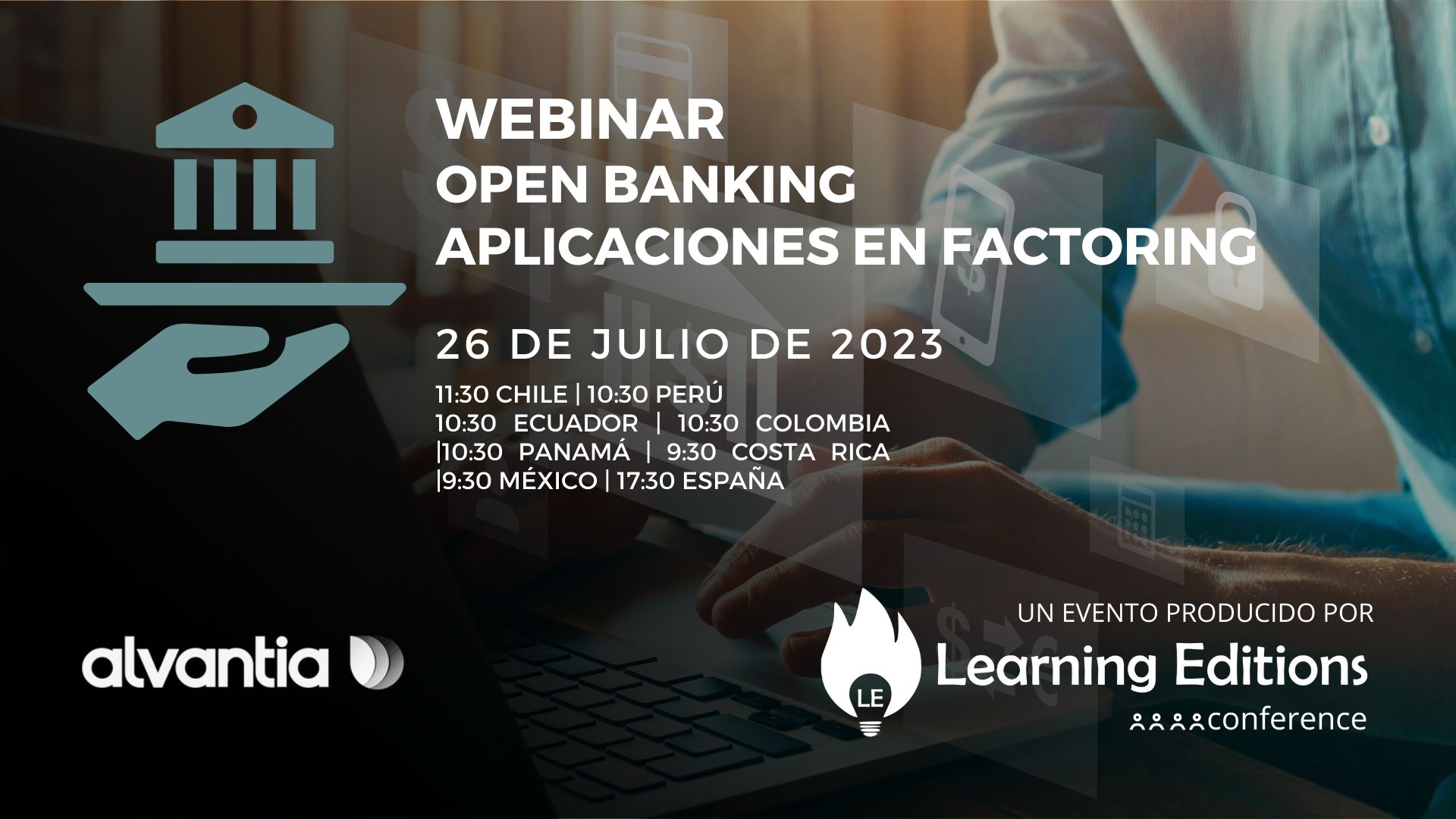Last Wednesday, July 26th, we had the opportunity to participate in an interesting webinar on the use of Open Banking in Factoring, in which different experts analyzed the benefits that access to new data on consumers can generate in the industry.
The event, organized by Learning Editions Conference, began with the presentation by
Erick Rincón Cárdenas
, who first defined Open Banking as the “practice of sharing financial information digitally, securely and on terms that customers approve.” He explained that this terminology was born in 2015 when the British government promoted the creation of the Open Banking Working Group, whose mission was to elaborate a framework focused on the development of open interface standards (API’s) for banking. Open Banking enables the sharing and provision of data and processes from financial institutions to a new ecosystem of third-party providers. For the expert, this has two major advantages: the personalization of financial products and services and risk mitigation.
Rincón then commented on the importance of APIs (a set of functions and protocols that enable data connectivity between two or more parties through an external interface), as they are “the tool that financial institutions have to achieve the ultimate goal of opening up to third parties”. Among the advantages offered by APIs, the expert highlighted standardization, access restriction, efficiency, personalization and security in the assignment of passwords.
Then we were able to listen to Andrés Tejada who presented the use of case of the fintech Floid. Floid is an Open Finance platform that collects data from a variety of sources on financial consumers in all the countries in which it operates. The company collects very complete data on consumers, so that the entities have a much more realistic picture of them and rely on this information when, for example, granting a loan. The financial entity will thus be able to analyze the data and validate the identity of each person, as well as the risk they represent in obtaining the financial product. “This broadens the spectrum and opportunities in the market, giving the potential customer the opportunity to be better known, so that the company can delve into the real capabilities of the person and provide financial inclusion. that our countries in Latin America need so badly,” said Tejada.
She then presented Juliana Carmona, who indicated that the main advantage of Open Banking for Factoring is “the help in risk decision making: knowing if the debtor/payer is going to pay”. In this regard, he highlighted the interesting data that the DIAN (in Colombia) can offer, which has the documents sent and received between the issuer and the payer (so that we can know for example if customers pay their taxes) and which includes all the traceability of invoices as securities. “The methodologies and technologies provided by Open Banking are fundamental to be able to process all the information available to us; a risk analysis can be made almost in real time and with the public information we have on the payer, we will be able to estimate whether he will pay or not and whether we can grant him a Factoring credit,” commented Carmona.
The last exhibition was in charge of our colleague José Antonio Garrote.José Antonio Garrote, who offered interesting data on fintech and Open Banking in relation to the Factoring market in Spain. Garrote indicated that the impact of fintechs is very small and they represent a very low percentage of the Spanish market. According to the expert, this is mainly due to two factors: on the one hand, until the end of 2015 factoring activity was restricted to entities regulated by the banking supervisor. At this point, the market was already very mature and, taking into account the recurrence of Factoring products, it was very difficult for a client to change entities. On the other hand, European banks have had access for many years to liquidity mechanisms that have allowed them to keep interest rates very low, and even negative. This is a barrier to entry for fintechs, which have had to “make do” with clients with a higher level of risk and who are willing to accept higher interest rates than market averages; but Garrote acknowledged the great work that fintechs have done: “they have done so well that there are banks that have used fintechs as a second market to obtain better returns”.
He also recalled that in Spain, much more work is carried out in Factoring without recourse than with recourse and, in this sense, he commented that in order to work with this type of Factoring “the study of risk and, therefore, the knowledge that can be obtained thanks to the data shared through API is very important”.
Finally, Garrote explained the advantages that Alvantia ‘s platform can offer in this digital business that can take advantage of Open Banking, highlighting the following:
-Self-service: so that all customers can carry out all operations online at any time and from anywhere in the world.
–Use ofthe cloud: to adapt the infrastructure to the needs of the business, allowing costs to be adjusted according to volumes.
-Interconnectivity: it is crucial with any business stakeholder, so having a service-oriented architecture (API-based) is essential.
-Automation: all business processes are fully automated and the platform is optimized to handle large volumes of information.
If you want to see the full content of the webinar, you can do it here.



